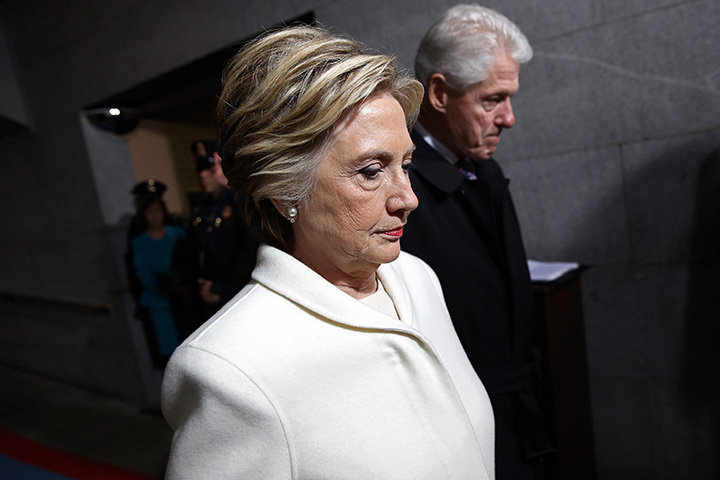“Mr. President, I’m sorry.”

Hillary Clinton never expected to say that on election night, but thanks to a new book, we know that after former president Barack Obama had called Clinton to offer his condolences on her loss, surrounded by bewildered aides all wondering how the campaign had ended so miserably for them, the Democratic nominee offered that apology.
We learned this and more, in Shattered, by journalists Jonathan Allen and Amie Parnes. In it, they chronicle the Clinton campaign’s attempt to elect the first female president.
READ MORE: Hillary Clinton ‘ready to come out of the woods’ and return to spotlight
With the book now out, many of Clinton’s critics are eager to reiterate the notions that she was a doomed candidate from the start, that Bernie Sanders would have been the better choice – despite being unable to win the Democratic nomination – all the while downplaying the impact of possible Russian meddling and FBI director James Comey‘s bizarre public announcement of the re-opening of the email investigation mere days before election day.
READ MORE: Hillary Clinton supporters blast FBI Director James Comey over Russian probe revelation
There’s a lot of criticism that can and should be levelled at the Clinton campaign. Campaign manager Robby Mook, for instance, apparently relied heavily on flawed data instead of traditional campaigning methods. As a result, the campaign made the moronic choice to stay out of the so-called “blue wall” states of Michigan, Pennsylvania and Wisconsin.
WATCH: Russians’ hatred of Hillary Clinton fueled efforts to influence election

There was no clear or consistent messaging throughout the campaign. Even the campaign’s slogan, “I’m With Her,” was abysmal. There is a reason Obama won with “Yes We Can” — that message was ultimately about the country and, more specifically, the voter. Clinton’s slogan might as well have been “Yes I can, I have the track record to prove it, so you should vote for me.”
READ MORE: James Comey confirms FBI investigating possible Russia, Donald Trump links
So yes, Clinton lost. She didn’t have to. Her campaign made mistakes, and as the ultimate authority, she owns them. But there is no reason to repeat the many false narratives that have now resurfaced in light of this book.
For starters, the notion that some other Democratic nominee would have been guaranteed a win against Trump is an incredible feat of mental gymnastics. It’s obviously impossible to say with certainty one way or another who would have won in a non-existent, fictional scenario, yet most Clinton critics are eager to assert that Bernie Sanders would have won, and point to early polling that shows Sanders beating Trump in a head to head match-up.
It is worth pointing out that the vast majority of people who were singed by the “Bern” are white, despite people of colour being a core voting bloc for Democrats. Sanders’ inability to connect with people of colour is long documented (and if you’ve ever heard him talk about the variety of contentious issues that surround race in America, you pretty quickly see the problem). Whenever he talked of racial inequality, his main talking points all went back to economic equality, ignoring the issue of systemic racism baked into the institutions serving Americans. That wasn’t his only problem, but for the Democrats, it’s kind of a big one.
WATCH: Hillary Clinton says ‘fake news’ is a threat to U.S. democracy

Then there’s also the fact that Sanders picked up four million fewer votes than Clinton in the primaries leading up to the Democratic convention. He’s is a life-long politician who only ran as a Democrat for political expediency. Do you know what comes along with being a life-long politician? Opposition research. None of it was presented during the primary campaign, and he still lost. Even a campaign as dysfunctional as Trump’s would have had access to Google and would have known how to use it.
But sure, a cantankerous septuagenarian socialist with limited support within the party establishment, representing a state with fewer people than Winnipeg, would have won against the GOP attack machine. The Bern would have produced a lot more light than heat.
READ MORE: Hillary Clinton to Democrats: ‘Let resistance plus persistence equal progress’
Then there’s the FBI, of course. Comey’s revelation that he had re-opened the investigation into the Clinton email scandal came 11 days before voters went to the polls. We now know Comey made the statement while the FBI was actively investigating ties between the Trump campaign and Russia, and that the re-opening of the email scandal revealed nothing at all.
Yet at the time the media coverage of Comey’s letter was constant and prominent and had a devastating impact on Clinton. FiveThirtyEight’s polling uber analyst Nate Silver even went so far as to say, “I’ll put it like this: Clinton would almost certainly be president-elect if the election had been held on Oct. 27 (the day before Comey letter).”
READ MORE: Hillary Clinton issues rallying cry to women: ‘The Future is Female’
Another criticism of Clinton, present throughout the campaign and now given new life, is the notion that Clinton simply didn’t speak to the economic anxiety felt by so many Trump voters, and that she instead focused too much on “identity politics.” Except when you break down her public statements, you see that perception simply isn’t true.
Clinton spoke of economic issues and jobs literally more than anything else. We also have ample data to suggest that the prime motivations for Trump voters were not economic anxiety or fear of globalization, but rather plain old-fashioned bigotry — or identity politics, if you will, that the president himself hardly shied away from. It seems silly to ignore this in order to continue the narrative of Clinton’s fundamental un-electability.
Clinton made a lot of mistakes, from start to finish. She has the rest of her life to ponder them, as just another citizen. However, any post-mortem analysis of the campaign needs to keep in mind that Clinton still managed to win the popular vote by a decisive margin of nearly three million. She also lost those three key “blue wall” states by less than one per cent of the vote.
Had a mere 80,000 people in those states voted the other way, she would have won the Electoral College as well. In that scenario, the Clinton campaign’s core mistake of reliance on data-driven decision making instead of traditional on the ground politicking stops being a fatal liability and instead becomes a daring and innovative revolution in campaigning, Trump is still angrily tweeting in his New York tower and I wouldn’t be currently looking into how to build a bunker that can withstand nuclear war.
That’s not what happened, obviously. But when we reflect on why, a little perspective can go a long way.








Comments